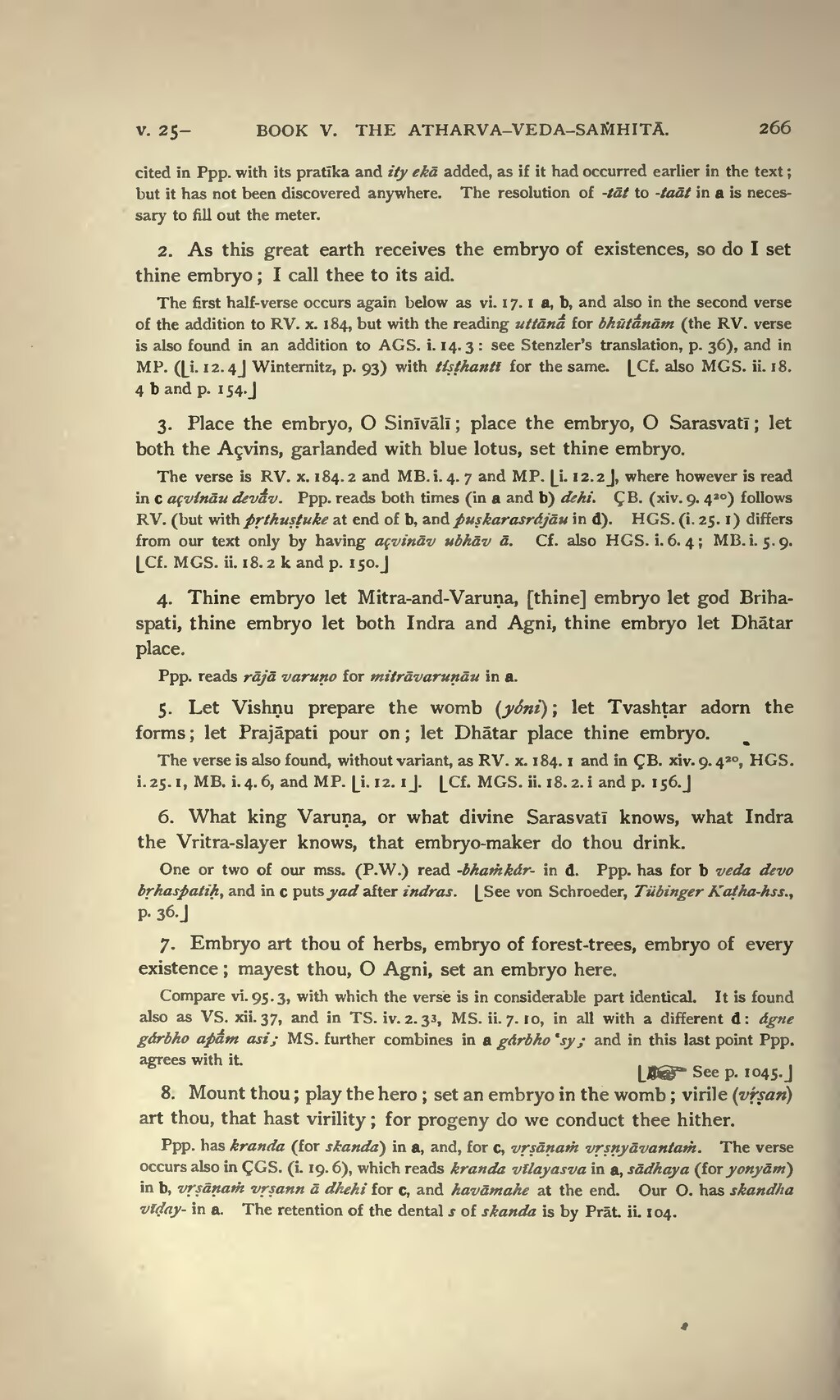2. As this great earth receives the embryo of existences, so do I set thine embryo; I call thee to its aid.
The first half-verse occurs again below as vi. 17. 1 a, b, and also in the second verse of the addition to RV. x. 184, but with the reading uttānā́ for bhūtā́nām (the RV. verse is also found in an addition to AGS. i. 14. 3: see Stenzler's translation, p. 36), and in MP. (⌊i. 12. 4⌋ Winternitz, p. 93) with tíṣṭhantī for the same. ⌊Cf. also MGS. ii. 18. 4 b and p. 154.⌋
3. Place the embryo, O Sinīvālī; place the embryo, O Sarasvatī; let both the Açvins, garlanded with blue lotus, set thine embryo.
The verse is RV. x. 184. 2 and MB. i. 4. 7 and MP. ⌊i. 12. 2⌋, where however is read in c açvínāu devā́v. Ppp. reads both times (in a and b) dehi. ÇB. (xiv. 9. 410) follows RV. (but with pṛthuṣṭuke at end of b, and puṣkarasrájāu in d). HGS. (i. 25. 1) differs from our text only by having açvināv ubhāv ā. Cf. also HGS. i. 6. 4; MB. i. 5. 9. ⌊Cf. MGS. ii. 18. 2 k and p. 150.⌋
4. Thine embryo let Mitra-and-Varuṇa, [thine] embryo let god Brihaspati, thine embryo let both Indra and Agni, thine embryo let Dhātar place.
Ppp. reads rājā varuṇo for mitrāvaruṇāu in a.
5. Let Vishṇu prepare the womb (yóni); let Tvashṭar adorn the forms; let Prajāpati pour on; let Dhātar place thine embryo.
The verse is also found, without variant, as RV. x. 184. 1 and in ÇB. xiv. 9. 420, HGS. i. 25. 1, MB. 1. 4. 6, and MP. ⌊i. 12. 1⌋. ⌊Cf. MGS. ii. 18. 2. i and p. 156.⌋
6. What king Varuṇa, or what divine Sarasvatī knows, what Indra the Vritra-slayer knows, that embryo-maker do thou drink.
One or two of our mss. (P.W.) read -bhaṁkár- in d. Ppp. has for b veda devo bṛhaspatiḥ, and in c puts yad after indras. ⌊See von Schroeder, Tübinger Kaṭha-hss., p. 36.⌋
7. Embryo art thou of herbs, embryo of forest-trees, embryo of every existence; mayest thou, O Agni, set an embryo here.
Compare vi. 95. 3, with which the verse is in considerable part identical. It is found also as VS. xii. 37, and in TS. iv. 2. 33, MS. ii. 7. 10, in all with a different d: ágne gárbho apā́m asi; MS. further combines in a gárbho ‘sy; and in this last point Ppp. agrees with it. ⌊☞ See p. 1045.⌋
8. Mount thou; play the hero; set an embryo in the womb; virile (vṛ́ṣan) art thou, that hast virility; for progeny do we conduct thee hither.
Ppp. has kranda (for skanda) in a, and, for c, vṛṣāṇaṁ vṛṣṇyāvantaṁ. The verse occurs also in ÇGS. (i. 19. 6), which reads kranda vīlayasva in a, sādhaya (for yonyām) in b, vṛṣāṇaṁ vṛṣann ā dhehi for c, and havāmahe at the end. Our O. has skandha vīḍay- in a. The retention of the dental s of skanda is by Prāt. ii. 104.
